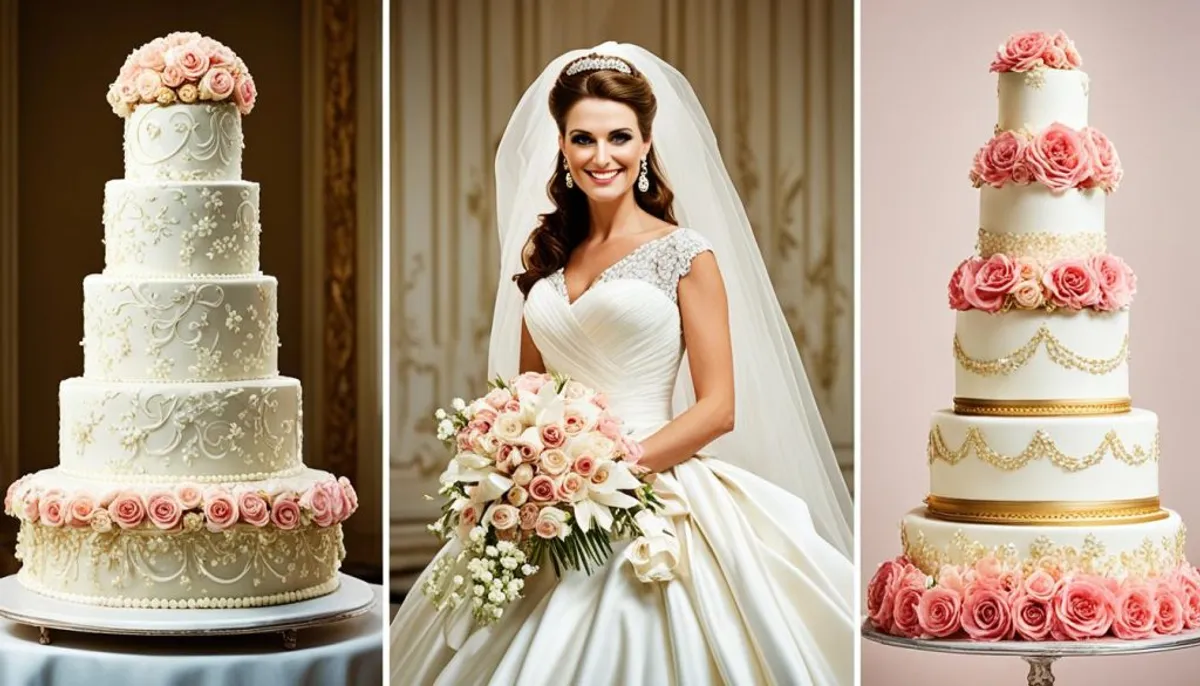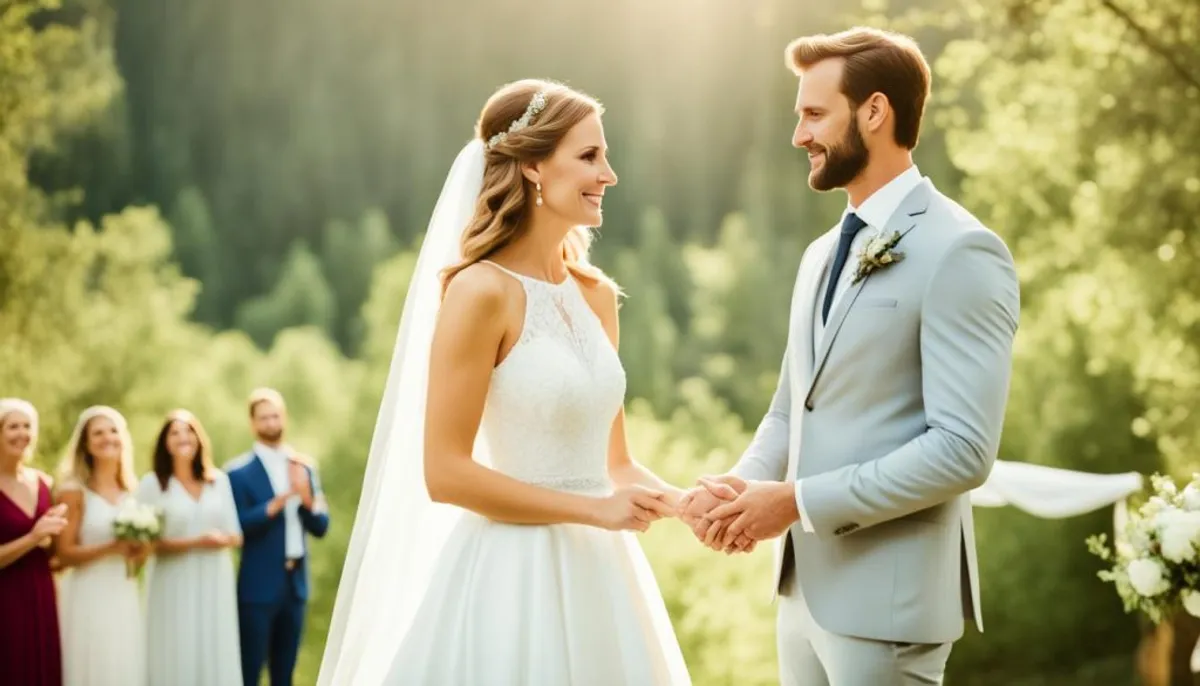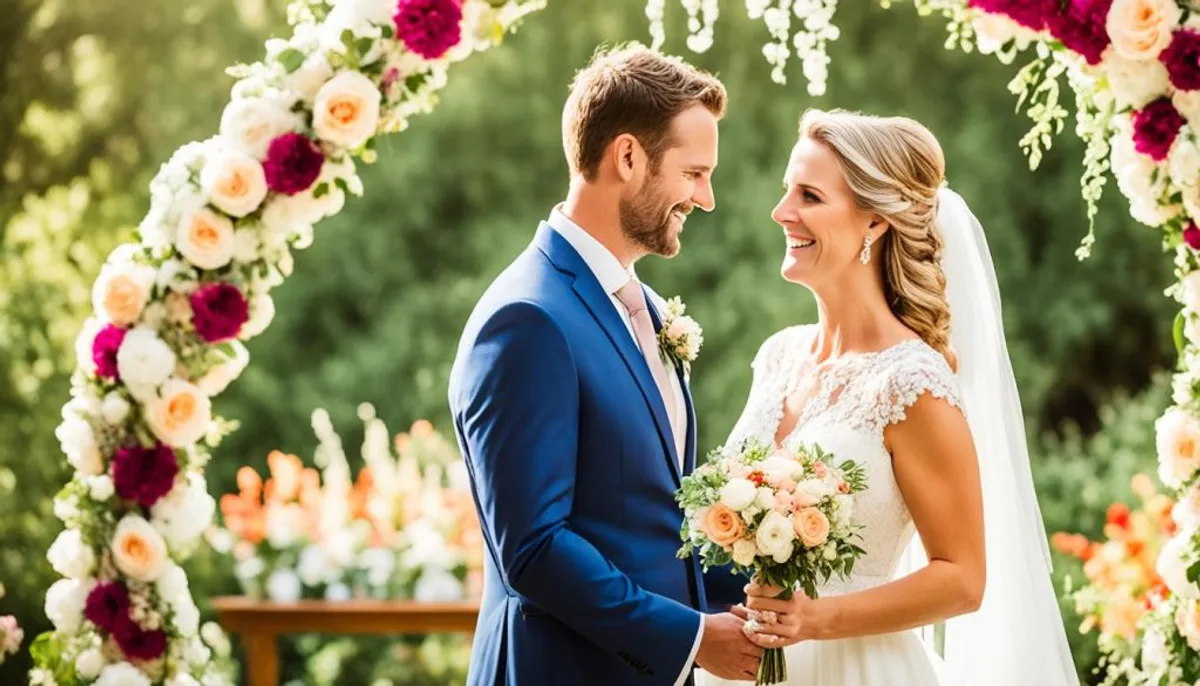The terms “wedding” and “marriage” are often used together, but they mean different things. They both show the joining of two people, but there are key differences. Let’s look at what makes a wedding and a marriage unique, focusing on their legal and ceremonial sides.

A marriage is a legal agreement that comes with many rights and duties. It’s a state-recognized bond that gives couples legal rights and benefits. A wedding, however, is the celebration that starts this marriage. It’s a special event where the couple shares their love and commitment with others, like family and friends.
Understanding the Distinction
It’s key to know the difference between marriage and wedding. These terms are often mixed up, but they mean different things legally and in ceremonies.
Marriage: The Legal Contract
A marriage is a legal deal that sets the rights and duties of the couple. It gives them legal benefits like inheritance rights and financial duties. Laws about marriage vary, but they cover what’s needed for a valid marriage.
Wedding: The Ceremonial Celebration
A wedding, on the other hand, is the big celebration of the marriage. It includes special rituals and vows that show the couple’s beliefs and traditions. The ceremony isn’t legal but is a big emotional and symbolic step for the couple.
Couples can pick when and where to have their legal marriage and their wedding. Some might do both on the same day, while others might have a small legal ceremony first, then a big celebration later.
Knowing the difference between marriage and wedding helps couples plan their big step together. It makes sure their journey fits their personal and cultural wishes.
The wedding vs marriage Debate
The debate between wedding and marriage has been ongoing for centuries. Marriage used to be a legal document proving a couple’s legitimacy and inheritance rights. Now, more couples choose non-religious or mixed-religion marriages, making the legal marriage and the ceremonial wedding separate.
Historical Perspective on Marriage
In the past, marriage was seen as a contract that formed a legal and social bond. It was often linked to religious and cultural traditions, with the ceremony marking the marital union. But as society changed, the legal marriage and the wedding celebration became more distinct.
Now, many couples opt for a wedding that might not be directly linked to the legal marriage. This sparks a debate on the importance of the wedding versus the marriage. It questions the roles of each in the journey of a lifelong married life, highlighting the love and appreciation for wife that should be celebrated alongside the legal commitments.
| Wedding | Marriage |
|---|---|
| Ceremonial celebration of the union | Legal contract that establishes the union |
| Reflects personal and cultural values | Governed by marriage laws and regulations |
| Focuses on the symbolic and emotional aspects | Focuses on the legal and financial implications |
The ongoing debate between wedding and marriage shows both are crucial in a lifelong partnership. Understanding their history and changing views helps couples make choices that match their values and goals. Effective communication in relationships is essential for navigating these choices and ensuring both partners feel valued and understood.
Tying the Knot: Registrar or Celebrant?
Couples have many choices when planning their wedding. They can choose a registrar-led ceremony, where the registrar does the legal part and also leads a non-religious ceremony. But, this might not be what they dream of because the registrar has legal limits.
Another option is a celebrant-led ceremony. This way, couples can make their wedding truly special. They work with a celebrant to add personal touches that show their love and values.
Registrar-led Marriage and Wedding Ceremony
Many couples pick a registrar-led wedding. The registrar takes care of the legal stuff and does a non-religious ceremony. It’s a simple way to get married legally.
But, it might not be what the couple wants for their wedding ceremony. The registrar follows the law and can’t change the ceremony much to fit what the couple likes.
Independent Celebrant-led Wedding Ceremony
For a wedding that’s all about them, couples might choose an independent celebrant. These celebrants make wedding ceremonies that match the couple’s story and values.
With an independent celebrant, couples can make their wedding ceremony just how they want. They can say their own vows and add special touches that a registrar might not allow.
| Registrar-led Marriage and Wedding Ceremony | Independent Celebrant-led Wedding Ceremony |
|---|---|
| Handles the legal aspects of the marriage laws | Focuses on crafting a personalized wedding ceremony |
| Offers a standardized non-religious ceremony | Allows for greater customization and personalization |
| Limited flexibility in customizing the ceremony | Empowers couples to design their dream wedding planning |
Humanist Weddings: A Non-Religious Alternative
In some countries, like Scotland, “Humanism” is a belief system recognized by law. A Humanist wedding is seen as a legal marriage. These weddings let couples make their wedding traditions and marital union their own, without any religious parts. This gives a non-religious choice for those wanting a custom wedding.
Humanist ceremonies let couples write their own vows and rituals. These reflect their personal beliefs and values. This way of celebrating marriage laws and wedding traditions is popular with couples who don’t believe in religion. They want to celebrate their love in a way that feels right to them.
- Personalized vows and rituals
- No religious elements included
- Recognized as a legal marriage in some countries
- Offers a non-religious alternative for couples
Humanist weddings offer a fresh choice for couples wanting to add personal meaning to their marital union. They avoid the usual religious parts of a wedding. This way, couples can express their love and appreciation for wife and have a wedding that truly shows who they are and what they believe.

Independent Celebrant: Crafting Your Dream Wedding
For couples wanting a wedding that shows off their unique style, an independent celebrant is a great pick. These experts can mix in different parts, like traditional words, special rituals, and personal vows. Additionally, having proof of kinship documents can enhance the process, ensuring everything is in order. This makes the wedding truly yours. You can then focus on the celebration and register your marriage legally separately.
Personalizing Your Wedding Ceremony
Working with an independent celebrant lets couples make their wedding ceremony special. They work closely to add in important traditions, cultural bits, and personal touches. This way, the ceremony truly shows the couple’s story and marks the beginning of their life together.
- Incorporate traditional or non-traditional wording and rituals
- Craft unique vows that capture the essence of your relationship
- Include cultural or religious elements that hold personal significance
- Involve family and friends in meaningful roles during the ceremony
- Choose a setting that aligns with your vision, whether it’s an intimate gathering or a grand celebration
An independent celebrant gives couples the chance to make their wedding ceremony unique. This makes the start of their marriage memorable and full of meaning.
| Celebrant Type | Personalization Opportunities | Legal Implications |
|---|---|---|
| Independent Celebrant | Extensive customization of ceremony content and flow | Separate legal marriage registration required |
| Registrar-led Ceremony | Limited personalization options, following standard format | Legal marriage automatically registered |
wedding vs marriage: Creating Lasting Memories
The wedding ceremony is the highlight of a couple’s journey together. It’s where they make memories that will last forever. By separating the legal marriage from the ceremony, couples can focus on the symbolic and personal parts of their big day. This makes the experience truly special.
The Symbolic Wedding Ceremony Experience
When the legal and ceremonial parts of marriage are separate, couples can make their wedding truly their own. They can weave their own personal stories into the day. This turns the wedding into a celebration that is deeply meaningful and memorable.
- Couples can add their cultural, religious, or family traditions to the ceremony. This honors their heritage and values.
- The ceremony can show off the couple’s unique personalities and their journey together. It becomes a one-of-a-kind event.
- They can focus on the symbolic and emotional aspects of the wedding. This means they don’t have to worry about the legal details.
By keeping the legal and ceremonial parts separate, couples can enjoy the best of both worlds. They can have a legal marriage and a destination wedding, perhaps even under a 30x45 ft tent. This creates a special and unforgettable experience that matches their vision for their life together.

Embracing the Difference
Couples who know the difference between a wedding and a marriage can make their celebrations fit their own style. They might choose to have a legal marriage at home and then a special wedding in a different place. This way, they can follow their own traditions and have a unique ceremony.
Combining Legal Marriage and Destination Wedding
This mix of a legal marriage and a destination wedding gives couples the best of both. They meet the legal needs at home and then celebrate in a way that shows who they are. The destination wedding can be all about their favorite customs and special touches, making it unforgettable.
By splitting the legal and ceremonial parts of their union, couples get to plan their wedding freely. They can skip local wedding rules and traditions. This is great for those who want a small, personal celebration or a big event in a special place.
Understanding the difference between wedding and marriage lets couples have a wedding that’s truly their own. It’s a way to celebrate their love and their commitment in a way that feels right to them. This makes their day not just a ceremony, but a real celebration of their unique bond.
Conclusion
The difference between a wedding and a marriage is key for couples to understand. A marriage is a legal agreement that encompasses various legal distinctions, while a wedding is the celebration of that union. Knowing this helps couples make their wedding special and meaningful, while also meeting legal marriage requirements.
The debate on wedding vs marriage has changed over time. Different traditions and views have shaped how we see these two concepts. Today, couples have many choices to make their wedding fit their beliefs and wishes.
The wedding and the marriage are both important in a couple’s journey to a lifelong commitment. By grasping the differences, couples can start this journey with a deeper respect for the legal, emotional, and cultural aspects of their union. Whether it’s a big celebration or a small gathering, both the wedding and the marriage build lasting memories and a strong base for a happy married life.
RelatedRelated articles



